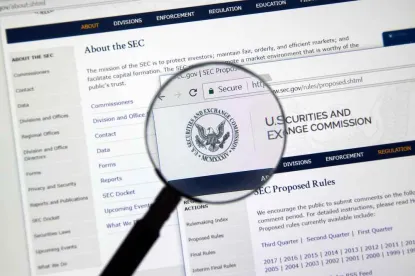On May 11, 2021, staff in the Division of Investment Management (IM) at the Securities and Exchange Commission issued a statement (the Statement) on “Funds Registered Under the Investment Company Act Investing in the Bitcoin Futures Market.” The Statement provides a series of warnings to retail investors about certain risks associated with investments in registered mutual funds whose portfolios include Bitcoin futures. But the Statement also provides further insight into the way SEC staff analyze the market for Bitcoin Futures more broadly.
The Statement indicates that IM staff, in coordination with SEC economists and the SEC’s Division of Examinations, will closely monitor the impact of mutual funds’ investments in Bitcoin futures on investor protection, capital formation, and the fairness and efficiency of markets. The SEC staff also noted that it intends to monitor and assess mutual funds’ and investment advisers’ ongoing compliance with the Investment Company Act and the other federal securities laws. The staff emphasized that investor protection and assessing the ongoing compliance of these funds is a top priority.
As part of this monitoring, the SEC staff expect to–
-
Analyze the liquidity and depth (e.g., number of participants) of the Bitcoin futures market and consider whether it is appropriately supporting mutual fund investment in Bitcoin futures – particularly as additional mutual fund assets enter the market – given regulatory requirements relating to mutual fund liquidity;
-
Analyze mutual funds’ ability to liquidate Bitcoin futures positions as necessary to meet daily redemption demands, as well as the efficacy of mutual funds’ derivatives risk management and the extent of any leverage obtained through derivatives;
-
Monitor funds’ valuations of holdings in the Bitcoin futures market and consider the impact of mutual fund participation in the Bitcoin futures market on valuations in that market, as well as the impact on valuation of any disruptions in the underlying Bitcoin markets;
-
Consider mutual funds’ liquidity classification of any position in the Bitcoin futures market and the basis for such classification and also consider the overall construction of a fund’s liquidity risk management program, including consideration of the liquidity of a fund’s strategy and portfolio investments during both normal and reasonably foreseeable stressed conditions, whether the investment strategy is appropriate for an open-end fund, and the extent to which the strategy involves a relatively concentrated portfolio or large positions in particular investments; and
-
Assess the ongoing impact of the potential for fraud or manipulation in the underlying Bitcoin markets and its possible influence on the Bitcoin futures market.
The Statement also provides a small window into the SEC’s evolving position on the propriety of Bitcoin ETFs. In particular, the Statement indicates that the SEC staff intend to consider whether, in light of the experience of mutual funds investing in the Bitcoin futures market, the Bitcoin futures market could accommodate ETFs. According to the SEC staff, ETFs (unlike traditional mutual funds) cannot prevent additional investor assets from coming into the ETF if the ETF becomes too large or dominant in the market, or if the liquidity in the market starts to wane. The Statement is careful to note that it is not a determination that the Bitcoin futures market is a significant market or market of significant size related to Bitcoin as those terms are used in Section 6(b)(5) of the Securities Exchange Act governing the registration of national securities exchanges. But, the Statement does leave open the possibility that data gathered as part of this process could change the SEC’s current view that securities exchanges are not able adequately police fraudulent and manipulative conduct in the underlying market for Bitcoin, a sentiment that new SEC Chairman Gary Gensler echoed during recent Congressional testimony.




 />i
/>i

